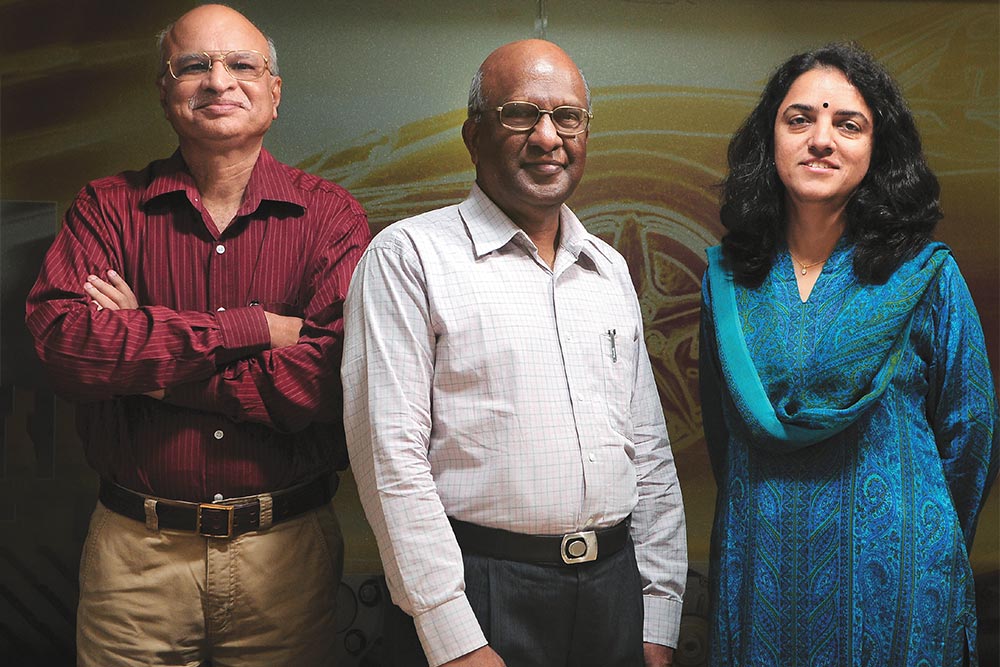There are two things that make Salem famous (and infamous): mangoes, and female foeticide. The perpetually hot and dusty city in north-central Tamil Nadu is closer to Bengaluru (175 km) than it is to Chennai (300 km). As we drive past to our destination, Mallasamudram, 25 km outside Salem, soporific haze envelopes the winding road and the countryside is rendered even more sluggish by one of TN’s frequent power cuts.
Mallasamudram, a small town with a population of 17,000, claims distinction from its three engineering colleges — about 2,500 students graduate from them every year. Even more interestingly, a company called Mahendra NextWealth is giving these graduates, who would otherwise migrate to metros in search of jobs, opportunities closer to home. Take the case of Poorni Selvam, an electronics engineer and a Mahendra NextWealth employee. “NextWealth has definitely given me a new lease of life,” says the dusky 22-year-old, who having lost both her parents stays with her ageing grandmother in Mallasamudram.
“If not for them [NextWealth], I would have had to move to the city for a job and worry about my grandmother being alone at home. But now I can support her and be financially independent without moving out of my hometown.” Sunder Velmurgan is another young man with a proud story — he even refused a government job that was offered to him when his father passed away just so he could stay with NextWealth.
“I am sure I can do much better here than in a government job,” he insists, even as, his ringtone belts out British band Queen’s rock anthem We will rock you. Even as I marvel at how far and long Freddie Mercury’s magic has travelled, many NextWealth employees tell me that working for the company has improved their quality of life in this remote town.
So what exactly does NextWealth do? Founded by Dr Sridhar Mitta, 63, Wipro’s first employee, and some of his former colleagues from the software major, including Mythily Ramesh, Anand Talwai and SR Gopalan in 2009, NextWealth pitches IT and BPO services from delivery centres which are managed by professional entrepreneurs in small towns and rural areas. “When you actually visit the centres, you realise the impact you have created,” says Mythily Ramesh, co-founder and CEO, NextWealth. “Most of them are first-time graduates and sole breadwinners for the family, and they have to put their younger siblings through college or get them married. Knowing that you have been instrumental in making a difference in each of their lives gives us great satisfaction.”
The company currently has four centres — two near Salem in Tamil Nadu and one each in Hubli in Karnataka and Chittoor in Andhra Pradesh. Together, these centres employ over 550 employees. Sridhar Mitta, founder and managing director, wants to scale the number of centres to 10 and the number of employees to 4,000 in the next couple of years. “We believe the next Wipro or Infosys will come from these small towns,” he says with conviction. “What happened with the US and India in terms of outsourcing will happen with Bengaluru and these tier 2 towns.”
Ground rules
NextWealth’s business model appears simple but is quite evolved: the company first identifies locations in tier 2, 3 or 4 towns based on their infrastructure, cost of living, and the supply of engineering graduates in close vicinity. Once they zero in on such a town for setting up a centre, they look for local entrepreneurs who have a strong connect with the geography plus the managerial and financial capability to run the centre.
NextWealth then mentors these entrepreneurs and helps them scale up their business. “NextWealth has not only helped scale up our business through their strategic inputs but also helped us standardise our processes and manage costs better,” says Faustino Avinash Rosario, co-founder and director at Mahendra NextWealth.
The setting-up of a 250-seat delivery centre requires an investment of almost Rs.90 lakh, and it takes about 18-24 months for the investment to breakeven. NextWealth says entrepreneurs can expect to take home net margins of 12-15%. Bank funding is available as SIDBI has declared NextWealth a bankable project, which makes it easier for entrepreneurs to get started.
Through all of this, the company remains a single entity for its customers even though, behind the scenes, responsibilities are clearly divided between NextWealth and its delivery centres. So, NextWealth sources business from clients and passes it on to the centres according to the skill sets available on location; it also manages quality and remains accountable for delivery of the contract. The delivery centres, on the other hand, have to hire and train people and they have to make sure all the milestones on the road to delivery are met on time.
NextWealth takes a 26% stake in the enterprise of the local entrepreneur in return for the industry expertise, clients and brand name it gives them. It believes that its distributed delivery centre model of having several centres with fewer employees will prove more cost effective than the existing business models of IT firms. Mitta says, “Replicating the existing business model in smaller towns will not work because, after a point, it will drive up costs in these places as well, just like it did in Bengaluru.”
NextWealth’s diversified employee pool is cheaper than metro-based human resources by 30-40%. It also leads to a more satisfying work culture and lowers attrition — employees like staying closer to home. While male engineering graduates don’t mind moving to larger cities for employment opportunities quite as much, less than 5% of the employable women make it out of their small hometowns. The rest stay back with their parents and take up jobs that are not commiserate with their qualifications — it is this segment that NextWealth successfully taps for its centres. For instance, almost 50% of the 350 employees at the Mallasamudaram centre are women.
The social impact of the business also can’t be forgotten. “We are not only creating a new business model, but also improving the human resource ecosystem in India,” says Anand Talwai, co-founder and executive director, NextWealth. The team at NextWealth is also convinced that it can scale up as its business model starts to find more favour with mainstream players. “People are realising that there is a huge market here as over 70% of the Indian population is in small towns,” says Mythily Ramesh. “Our business model is well set to ride this small-town revolution.”
It’s different
NextWealth is now starting to experiment with newer services, such as processing and coding healthcare claims, which is outside of its IT and BPO focus. A group of employees at Mahendra NextWealth teach math to high school kids all over the world — TutorVista, an online tutoring company, started working with NextWealth three years ago with a pilot of 25 tutors.
Currently, there are about 50 tutors at Mahendra NextWealth in Mallasamudram alone and that number is likely to go up to 100 once the academic session starts. Most of Tutor Vista’s 2,000 tutors are scattered across 123 cities in India and work out of their homes — through NextWealth, they are able to establish a centre and test-market their services without incurring capital costs.
“With NextWealth, we established a centre-based model from where we were able to launch new services,” says K Ganesh, founder and CEO of TutorVista. “Their ability to deliver world class services out of smaller towns without compromising on quality is a testimonial to their business model.”
The Chittoor centre is on to even more colourful things — currently, there are 45 employees working out of this NextWealth centre for Scancafe. Clients send over digital photos of family weddings or vacations and employees at the Chittoor centre pick out the best pictures to design coffee-table books out of them. “We felt our business is a great model to try out in the rural set-up because purely visual skills are required,” says Naren Dubey, COO, Scancafe. “We have been working with NextWealth for more than two years and through them, we have greater stability in our business as their employees are a lot more committed.”
There is a flip side — convincing mainstream Indian IT companies that quality work can be done out of smaller towns is proving to be a challenge. “It’s ironic that firms that have thrived on outsourcing done from the US are now reluctant to outsource to smaller towns,” says Mitta with some regret, even though he is confident of winning them over eventually. After all, he does know a thing or two about convincing clients.
Twenty years ago, when he was working with Wipro and attempting to bring back business from the US, he had to field questions like: “Where is India? Do you speak English in India?” He replied by drawing maps and managed to bag contracts consistently, so he has reason to believe the Indian counterparts just need some diligent persuasion. “Only the questions are different this time,” smiles the man who believes the next ten years will be the decade of small towns. “Can they speak English in Salem? Do they have broadband connections?”












 Just one email a week
Just one email a week